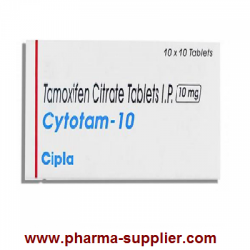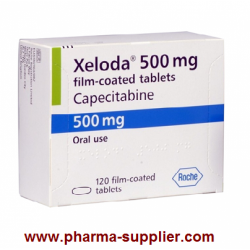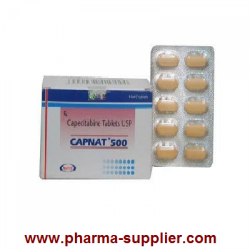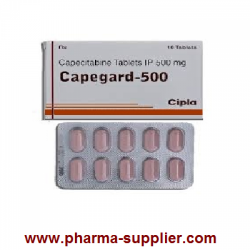Breast cancer
What is Arimidex (Anastrozole 1mg Tablets) ?
Arimidex 1 mg contains Anastrozole, a non-steroidal aromatase inhibitor used in the treatment of hormone receptor-positive breast cancer in postmenopausal women. It works by lowering estrogen levels in the body, which slows or stops the growth of estrogen-dependent tumors.
How to Use Arimidex 1 mg
Dosage: Typically, one tablet daily or as prescribed by your doctor.
Instructions: Take at the same time each day, with or without food. Do not stop use without consulting your doctor.
Who Should Not Use Arimidex?
Do not use if you:
Are pregnant or breastfeeding.
Are premenopausal (unless directed by a specialist).
Have severe liver disease or are allergic to Anastrozole.
Side Effects
Common Side Effects:
Hot flashes
Joint or muscle pain
Fatigue
Nausea
Serious Side Effects (Seek Medical Help):
Osteoporosis or bone fractures
Chest pain or shortness of breath
Liver function changes
Precautions
Regular bone density monitoring is advised.
Inform your doctor about any history of heart disease, liver problems, or osteoporosis.
Not recommended for children or men.
What is Cytotam 10?
Cytotam 10 contains Tamoxifen Citrate 10 mg, a selective estrogen receptor modulator (SERM) used primarily in the treatment and prevention of breast cancer in both premenopausal and postmenopausal women. It works by blocking the effects of estrogen in breast tissue, slowing or stopping the growth of hormone-sensitive tumors.
Uses of Cytotam 10
Treatment of estrogen receptor-positive breast cancer
Prevention of breast cancer in high-risk individuals
May also be prescribed for infertility in women due to ovulation issues
How to Use Cytotam 10
Dosage: As prescribed by a doctor (commonly 10–20 mg once or twice daily)
Instructions: Take with or without food. Swallow with water at the same time each day.
Contraindications
Avoid using Cytotam 10 if you:
Are allergic to Tamoxifen
Have a history of blood clots (DVT, PE)
Are pregnant or breastfeeding
Side Effects
Common Side Effects:
Hot flashes
Nausea
Irregular periods
Fatigue
Serious Side Effects (Seek Medical Help):
Vision changes
Swelling or pain in legs (possible blood clot)
Unusual vaginal bleeding
Precautions
Regular monitoring may be required (liver function, blood clot risk)
Inform your doctor about any history of stroke, uterine cancer, or liver problems
Avoid pregnancy while taking Tamoxifen and for 2 months after stopping it
What is Xeloda 500 mg?
Xeloda 500 mg contains Capecitabine, an oral chemotherapy drug used to treat various cancers including breast cancer, colorectal cancer, and gastric cancer. It works by converting into 5-fluorouracil (5-FU) in the body, which interferes with the growth of cancer cells.
How to Use Xeloda 500 mg
Dosage: As prescribed by an oncologist based on your body surface area, condition, and response.
Instructions: Usually taken twice daily (morning and evening) within 30 minutes after a meal. Swallow whole with water.
Treatment Cycle: Often given in 2-week cycles followed by a rest period.
Contraindications
Do not use if:
Allergic to Capecitabine or fluorouracil.
You have severe liver or kidney impairment.
You are pregnant or breastfeeding (unless approved by your doctor).
Side Effects
Common Side Effects:
Diarrhea
Hand-foot syndrome (redness/swelling)
Nausea, vomiting
Fatigue
Serious Side Effects (Seek Help):
Severe diarrhea or dehydration
Chest pain or difficulty breathing
Signs of liver issues (yellowing skin/eyes)
Precautions
Inform your doctor if you have:
A history of heart disease, liver or kidney issues
Low blood cell counts
DPD enzyme deficiency
Avoid alcohol and grapefruit while on this medication.
What is Capnat 500 mg?
Capnat 500 mg contains Capecitabine, an oral chemotherapy drug used to treat various cancers, including breast cancer, colorectal cancer, and gastric cancer. It works by converting into 5-fluorouracil (5-FU) in the body, which stops the growth of cancer cells.
How to Use Capnat 500 mg
Dosage: As prescribed by your oncologist, usually twice a day after meals.
Instructions: Swallow the tablet whole with water; do not crush or chew.
Contraindications
Do not use if:
Allergic to Capecitabine or fluorouracil.
You have severe liver or kidney impairment.
You are pregnant or breastfeeding.
Side Effects
Common Side Effects:
Diarrhea
Nausea
Fatigue
Hand-foot syndrome (redness, pain, swelling of palms/soles)
Serious Side Effects (Seek Help):
Severe abdominal pain
Blood in stool
Signs of infection (fever, chills)
Unusual bleeding or bruising
Precautions
Inform your doctor if you have:
Liver/kidney disorders
Heart problems
History of dihydropyrimidine dehydrogenase (DPD) enzyme deficiency
What is Capegard 500 mg?
Capegard 500 mg contains Capecitabine, an oral chemotherapy drug used to treat various cancers, including breast cancer, colon cancer, and rectal cancer. It is a prodrug that converts into 5-fluorouracil (5-FU) in the body, which interferes with cancer cell growth and slows tumor spread.
How to Use Capegard 500 mg
Dosage: As directed by your oncologist.
Instructions: Take the tablet with water within 30 minutes after a meal. Do not crush or chew.
Indications
Used for the treatment of:
Metastatic breast cancer
Colorectal cancer (colon and rectum)
Gastric cancer (as per your doctor's prescription)
Side Effects
Common Side Effects:
Nausea, vomiting
Fatigue
Diarrhea
Hand-foot syndrome (redness, swelling, or pain in palms/soles)
Serious Side Effects (Seek Immediate Help):
Severe diarrhea or vomiting
Mouth ulcers
Signs of infection (fever, chills)
Unusual bleeding or bruising
Warnings and Precautions
Inform your doctor if you have liver or kidney issues.
Not recommended during pregnancy or breastfeeding.
Avoid alcohol and consult your doctor before taking any other medications or supplements.
- 1




